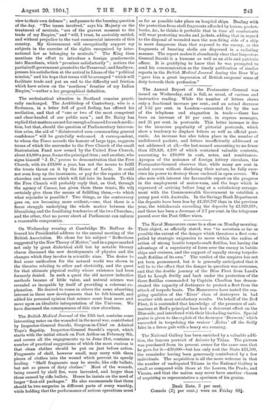The ecclesiastical situation in Scotland remains practi- cally unchanged. The
Archbishop of Canterbury, who is a Scotsman, in a letter full of good feeling, has offered his mediation, and that of "one or two of the most competent and clear-headed of our public men" ; and Dr. Rainy has replied that matters are not far enough advanced for such media- tion, but that, should the question of Parliamentary interven- tion arise, the aid of "disinterested men commanding general confidence" will be gratefully welcomed. A correspondent, to whom the Times accords the honour of large type, suggests terms of which the surrender to the Free Church of the small Sustentation Fund now owned by the United Free Church, about 24,000 a year, forms the principal item ; and another, who signs himself "J. D.," proves to demonstration that the Free Church, with its 213,000 a year, has not the means to fulfil the trusts thrust on it by the House of Lords. It could not even keep up the insurances, or pay for the repairs of the churches and manses which will fall into its hands. To this the Free Church will probably reply that, as God, through the agency of Caesar, has given them these trusts, He will certainly give them the means of fulfilling them,—to which what rejoinder is possible ? Two things, as the controversy goes on, are becoming more evident,—one, that there is a fierce struggle underlying the whole matter between the liberalising and the fossilising tendencies of the two Churches; and the other, that no power short of Parliament can enforce a reasonable compromise.


































 Previous page
Previous page